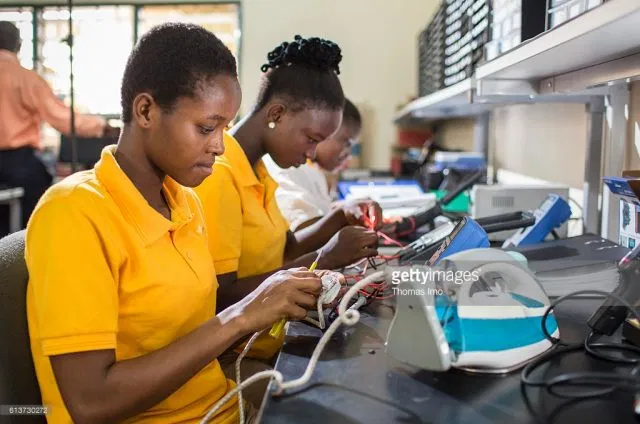In 2020, the Design and Technology Institute (DTI) embarked on a partnership with the Mastercard Foundation, aimed at creating opportunities for 1000 young men and women to benefit from DTI education.
The primary goal was to ensure that 80 percent of the intake consisted of female learners, thereby empowering women in technical and vocational education and training (TVET). This exclusive opportunity was extended to young people from all over Ghana, marking a significant milestone in the efforts to transform youth Technical and Vocational Education and Training (TVET) livelihoods across West Africa.
Founded in June 2016 by Constance Swaniker, one of Africa’s leading metal fabrication experts, DTI has been at the forefront of disrupting the traditional model of TVET in Ghana. With a mission to change the perception of TVET careers among young people in Ghana and Africa, DTI has set out to become West Africa’s premier industrial job training and prototype center within 10 years.
The partnership with the Mastercard Foundation marked a significant turning point for DTI. Over three years, from June 2020 to May 2023, the Transforming Youth TVET Livelihoods for Sustainable Jobs programme was implemented. This ambitious programme had several key objectives, including delivering precision fabrication training and work readiness skills to 1000 talented youth at global standards. Additionally, it sought to enhance access to quality employment-oriented skills training for women, low-income individuals, and vulnerable groups.
Furthermore, the programme aimed to roll out precision quality training for master craftsmen, small and medium-sized enterprises (SMEs), and technical universities nationwide. Collaboration with the Ghana Standards Authority and Council for Technical and Vocational Education and Training (COTVET) was also a crucial component of the programme. This collaboration was designed to shape national TVET policy, promote standards, and implement an effective regulatory and certification regime.
One of the most innovative aspects of the partnership was the focus on designing and testing prototypes for industrial products and components demanded by local supply chains. This emphasis on innovation and practical application underscores DTI’s commitment to championing locally sourced product innovations and celebrating gender diversity in employment.
By advocating for an enabling environment in West Africa to support the rapid formation and launch of innovative local businesses, DTI and the Mastercard Foundation have demonstrated a shared vision for sustainable economic development in the region.
The impact of this partnership has been far-reaching. By offering an exclusive opportunity for young people to pursue education and training at DTI, particularly with a focus on empowering female learners, the Mastercard Foundation has played a pivotal role in reshaping the landscape of TVET in Ghana. The emphasis on precision fabrication training and work readiness skills has equipped these young individuals with the tools they need to thrive in a competitive industrial environment.
One of the female beneficiaries of the programme sharing her thoughts on the impact of the programme said “One of the skills I gained from DTI that I applied while organizing the charge sprint here in Africa was the ability to design a charging station. We had people from diverse backgrounds, and I used my 3D design skills to create the charging station. This opportunity allowed me to work with a team and showcase my abilities.”
Looking ahead, the impact of this partnership is poised to extend beyond the immediate beneficiaries of the programme. As graduates of DTI enter the workforce with enhanced skills and expertise, they will contribute to the growth of local supply chains and drive innovation in industrial production. The emphasis on gender diversity in employment also sets a powerful precedent for inclusivity and equal opportunity in the industrial sector.
The partnership with the Mastercard Foundation stands as a testament to the transformative power of collaboration. By empowering young men and women with the skills they need to succeed in industrial careers, DTI and the Mastercard Foundation are paving the way for sustainable economic development and prosperity across West Africa.
Key Objectives of the Partnership
- Deliver Precision Fabrication Training
- Training and work readiness skills for 1000 talented youth at global standards.
- Increase Access to Quality Training
- Focus on women, low-income, and vulnerable groups.
- Roll Out Precision Quality Training
- For master craftsmen, SMEs, corporates, and technical universities nationwide.
- Collaborate for Policy and Standards
- Partnering with Ghana Standards Authority (GSA) and COTVET to shape national TVET policy.
- Innovative Prototypes and Local Supply Chains
- Design and test prototypes for industrial products and components needed locally.
Achievements
- Impact on Youth: Over 1000 young people trained across Ghana.
- Promoting Gender Diversity: Increased participation of women in technical fields.
- Supporting Vulnerable Groups: Providing opportunities for low-income and vulnerable communities.
- Policy Influence: Contributing to effective regulatory and certification regimes.
- Local Innovation: Encouraging locally sourced product innovations and green industrial practices.
- Addressing Youth Unemployment: Equipped youth with practical skills, helping to mitigate the challenge of 350,000 graduates entering the job market annually without the necessary skills.










